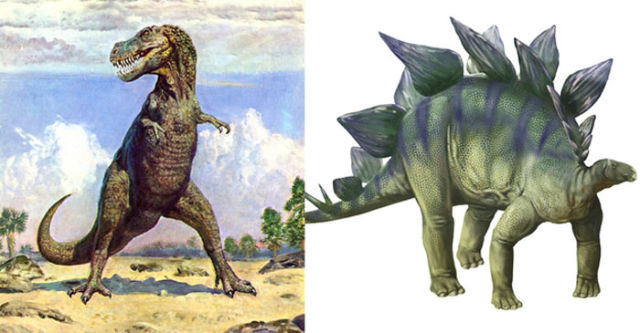9.
jubyp0b 13 year s ago
#31 It doesn't weigh more. It has the same mass. It only applies more pressure.
For each action, there is a reaction. The action (force over an area, aka - pressure) necessary to compress a spring will create a force that has the same direction as the Weight / Load (G) of the spring. Thus, if weighed, it will show it weighs more (F), when it is actually only showing it's weight (G) and the necessary force to compress the spring (Fn).
F = G + Fn
For each action, there is a reaction. The action (force over an area, aka - pressure) necessary to compress a spring will create a force that has the same direction as the Weight / Load (G) of the spring. Thus, if weighed, it will show it weighs more (F), when it is actually only showing it's weight (G) and the necessary force to compress the spring (Fn).
F = G + Fn
10.
nora.miriam.18 13 year s ago
That's what he said. It weighs more. He never said it has more mass.
11.
jubyp0b 13 year s ago
@ nora.miriam.18
Are you for real?
weight
/wāt/
Noun
A body's relative mass or the quantity of matter contained by it, giving rise to a downward force.
mass
/mas/
Noun
A coherent, typically large body of matter with no definite shape.
In everyday usage, mass is referred to as "weight", the units of which may be pounds or kilograms (for instance, a person's weight may be stated as 75 kg). In scientific use, however, the term "weight" refers to a different, yet related, property of matter. Weight is the gravitational force acting on a given body—which differs depending on the gravitational pull of the opposing body (e.g., a person's weight on Earth vs on the Moon) — while mass is an intrinsic property of that body that never changes.
You do realize they're related now, right? weight = mass * gravitational acceleration.
Think of it this way: if you weigh something, it has "x" pounds / kilograms. If you push down the before mentioned something (apply pressure to the apparatus doing the measurement), it'll show you it weighs "y". "y" = "x" + "p" (the pressure you've applied). Does the object weigh more? Does it have more mass? No and no.
What the fuck.
@ rudy
Traian Vuia flew the first monoplane.
The Wright Brothers flew the first airplane.
And the U.S.A. bombed Hiroshima in '45, whilst Pearl Harbor was attacked in '41.
Are you for real?
weight
/wāt/
Noun
A body's relative mass or the quantity of matter contained by it, giving rise to a downward force.
mass
/mas/
Noun
A coherent, typically large body of matter with no definite shape.
In everyday usage, mass is referred to as "weight", the units of which may be pounds or kilograms (for instance, a person's weight may be stated as 75 kg). In scientific use, however, the term "weight" refers to a different, yet related, property of matter. Weight is the gravitational force acting on a given body—which differs depending on the gravitational pull of the opposing body (e.g., a person's weight on Earth vs on the Moon) — while mass is an intrinsic property of that body that never changes.
You do realize they're related now, right? weight = mass * gravitational acceleration.
Think of it this way: if you weigh something, it has "x" pounds / kilograms. If you push down the before mentioned something (apply pressure to the apparatus doing the measurement), it'll show you it weighs "y". "y" = "x" + "p" (the pressure you've applied). Does the object weigh more? Does it have more mass? No and no.
What the fuck.
@ rudy
Traian Vuia flew the first monoplane.
The Wright Brothers flew the first airplane.
And the U.S.A. bombed Hiroshima in '45, whilst Pearl Harbor was attacked in '41.











For each action, there is a reaction. The action (force over an area, aka - pressure) necessary to compress a spring will create a force that has the same direction as the Weight / Load (G) of the spring. Thus, if weighed, it will show it weighs more (F), when it is actually only showing it's weight (G) and the necessary force to compress the spring (Fn).
F = G + Fn
Are you for real?
weight
/wāt/
Noun
A body's relative mass or the quantity of matter contained by it, giving rise to a downward force.
mass
/mas/
Noun
A coherent, typically large body of matter with no definite shape.
In everyday usage, mass is referred to as "weight", the units of which may be pounds or kilograms (for instance, a person's weight may be stated as 75 kg). In scientific use, however, the term "weight" refers to a different, yet related, property of matter. Weight is the gravitational force acting on a given body—which differs depending on the gravitational pull of the opposing body (e.g., a person's weight on Earth vs on the Moon) — while mass is an intrinsic property of that body that never changes.
You do realize they're related now, right? weight = mass * gravitational acceleration.
Think of it this way: if you weigh something, it has "x" pounds / kilograms. If you push down the before mentioned something (apply pressure to the apparatus doing the measurement), it'll show you it weighs "y". "y" = "x" + "p" (the pressure you've applied). Does the object weigh more? Does it have more mass? No and no.
What the fuck.
@ rudy
Traian Vuia flew the first monoplane.
The Wright Brothers flew the first airplane.
And the U.S.A. bombed Hiroshima in '45, whilst Pearl Harbor was attacked in '41.